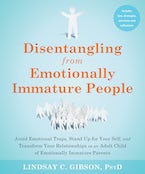By Lindsay C. Gibson, PsyD, author of Disentangling from Emotionally Immature Parents
Emotional immaturity encompasses a wide range of personality styles. People can be very different yet still show the traits of emotional immaturity. This syndrome is not a type of mental illness, and ordinary, “normal” people may show its signs. People with psychiatric diagnoses often have underlying immaturity, but not all EIPs qualify for a psychiatric diagnosis. A person’s EI traits become especially noticeable when stress increases or relationships become more intimate.
Emotional immaturity is easier to recognize if you focus on the basics. Although emotional immaturity exists on a continuum of severity, the following five characteristics are foundational in all EIPs, independent of their personality type or level of functioning:
Egocentrism is the basis of the EIP’s orientation toward life. Like young children, they primarily view the world through their own self-preoccupations and swiftly entangle you in their expectations.
With such a self-centered approach, EIPs have limited empathy for others. They don’t put themselves in other people’s shoes nor imagine their inner experience. While they may be intelligent and socially skilled, they don’t feel for other people so much as sense advantage and opposition. This is why an EIP can be an admired or powerful figure in society, yet still have trouble relating to other people in an adequately mature way.
Although EIPs may be plenty smart, they avoid self-reflection. Self-justifying and often self-righteous, they rarely question themselves. They focus on their immediate emotions and desires, seemingly oblivious to how they’re impacting others or even their own future. Instead of reflecting on their behavior, they get defensive and double down on their own position if someone gets upset with them.
When it comes to getting close to other people, EIPs pull back from emotional intimacy. They have a hard time accepting heartfelt emotion from others and certainly have trouble giving it. They may seem highly emotional when they blow up or lose emotional control, but that’s not the same as emotional intimacy. Emotional intimacy occurs between two people who share and process emotional information with each other, getting to know one another at a deep level. This process need not even be in words; it can be the sense one feels that the other person “gets” you and can connect with you in a deeply authentic way. In contrast, EIPs are more likely to become defensive, evasive, or belligerent when others (including their children) try to relate to them with emotional openness and honesty. (You can imagine the negative effect this kind of response has on a young child seeking connection.)
In their approach to the world, EIPs use affective realism, defining reality as what they feel it to be (Barrett and Bar 2009). Their psychological coping mechanisms are immature (G. Vaillant 2000) and simplistic, especially as they deny, dismiss, or distort any reality they don’t like. Their lack of rational objectivity means that it’s nearly impossible to reason with them once their emotions take hold.
Now let’s look at some additional characteristics. Some EIPs are extroverted and dominant, while others are more introverted, passive, and dependent. But whatever their style, EIPs tend to be rigid, superficial, rather shallow personalities. They often express themselves in platitudes or clichéd sound bites that are lacking in real thought. They are not well integrated psychologically, meaning that conflicting aspects of their personality coexist with no awareness of contradiction. They can say one thing and do another with no embarrassment because they don’t notice the mismatch. They focus on the immediate “part” of a situation, not its whole meaning.

Emotionally, they live in the present moment, blurting the first thing that comes to mind and reacting with no regard for the long-term effects of their impulsivity. Their high reactivity also means they are easily overwhelmed, making any problem feel like an emergency to them.
EIPs think in simplistic, literal, black-and-white terms. Logic tends to be used mostly as an opportunistic weapon, not as an essential determinant of their thinking. They typically oversimplify complex topics in ways that make it hard to reason with them.
Actively dominant EIPs overrun other people’s ideas and boundaries. Many are very status and role conscious, expecting others to keep to their assigned roles. Even a more passive and acquiescent EIP won’t show much empathy or interest in your life. Your subjective experience just doesn’t register with them. They expect you to mirror their moods: if they’re happy or upset, you should be too.
EIPs jump to conclusions and easily take offense, making it extremely hard—if not impossible—to talk out problems and disagreements. In conversation, they don’t listen well because, like children, they are always vying for center stage. When communicating, they are set on “broadcast” rather than “receive.” They have little curiosity for your viewpoint and feel affronted and unloved if you don’t do what they want.
More dominant EIPs have low stress tolerance, tend to be impatient, and pressure others to give them what they want. They expect their relationships to revolve around their reactive emotions, and they relate primarily through pronouncements, controls, and demands. Impatience plus egocentrism means that they take things personally and blame everything on other people. EIPs also can be irrationally stubborn, with hair-trigger defensiveness toward anything that threatens their beliefs or self-esteem. They are prone to meltdowns, making people around them feel rushed, criticized, and fearful of upsetting them further. The more passive EIPs may not be as flamboyant emotionally, but underneath their relatively calm demeanor lurks an implacable egocentrism concerning their agendas and motivations.
In close relationships, EIPs expect others to stabilize them emotionally and prop up their self-esteem. The burden of maintaining peace in the relationship usually falls to the other person because EIPs don’t do the emotional work (Fraad 2008) necessary to keep relationships on an even keel. Insensitive to others’ feelings, they think that love means giving blanket approval and letting them do whatever they want. Like a young child, an EIP gains power by distressing others until they capitulate. After funneling your attention into an EIP, you’ll probably come away feeling depleted and drained of energy.
Even the quieter EIPs are instinctively emotionally coercive, controlling you with guilt, fear, shame, or self-doubt. Unless you give in, they will peg you as bad or untrustworthy, and if you do something they don’t like, they will confide in other people against you rather than dealing with you directly.
Whether EIPs demand your attention and self-sacrifice or quietly expect you to prop them up, they have a hard time accepting love. When you act lovingly toward them, they act as if they can’t stand to let it in. With such poor receptive capacity (L. M. Vaillant 1997), they are like a distressed child who won’t let their parent soothe them. The closer you try to get to them, the more they pull back. This is because emotional intimacy threatens to overwhelm and disorganize them. Their fear of emotional intimacy often comes out in irritability, provocations, or conflicts that forestall closeness or vulnerability.
Because EIPs project blame onto other people, you might unwittingly accept their confusing distortions and take responsibility for things that weren’t your fault. Therefore, it is critically important to maintain healthy detachment and think objectively about their behavior.
Lindsay C. Gibson, PsyD, is a clinical psychologist in private practice who specializes in individual psychotherapy and coaching with adult children of emotionally immature parents. She is author of Adult Children of Emotionally Immature Parents, Recovering from Emotionally Immature Parents, and Self-Care for Adult Children of Immature Parents.



 2024 Peace Playbook: 3 Tactics to Avoid Clashes with Your Partner
2024 Peace Playbook: 3 Tactics to Avoid Clashes with Your Partner